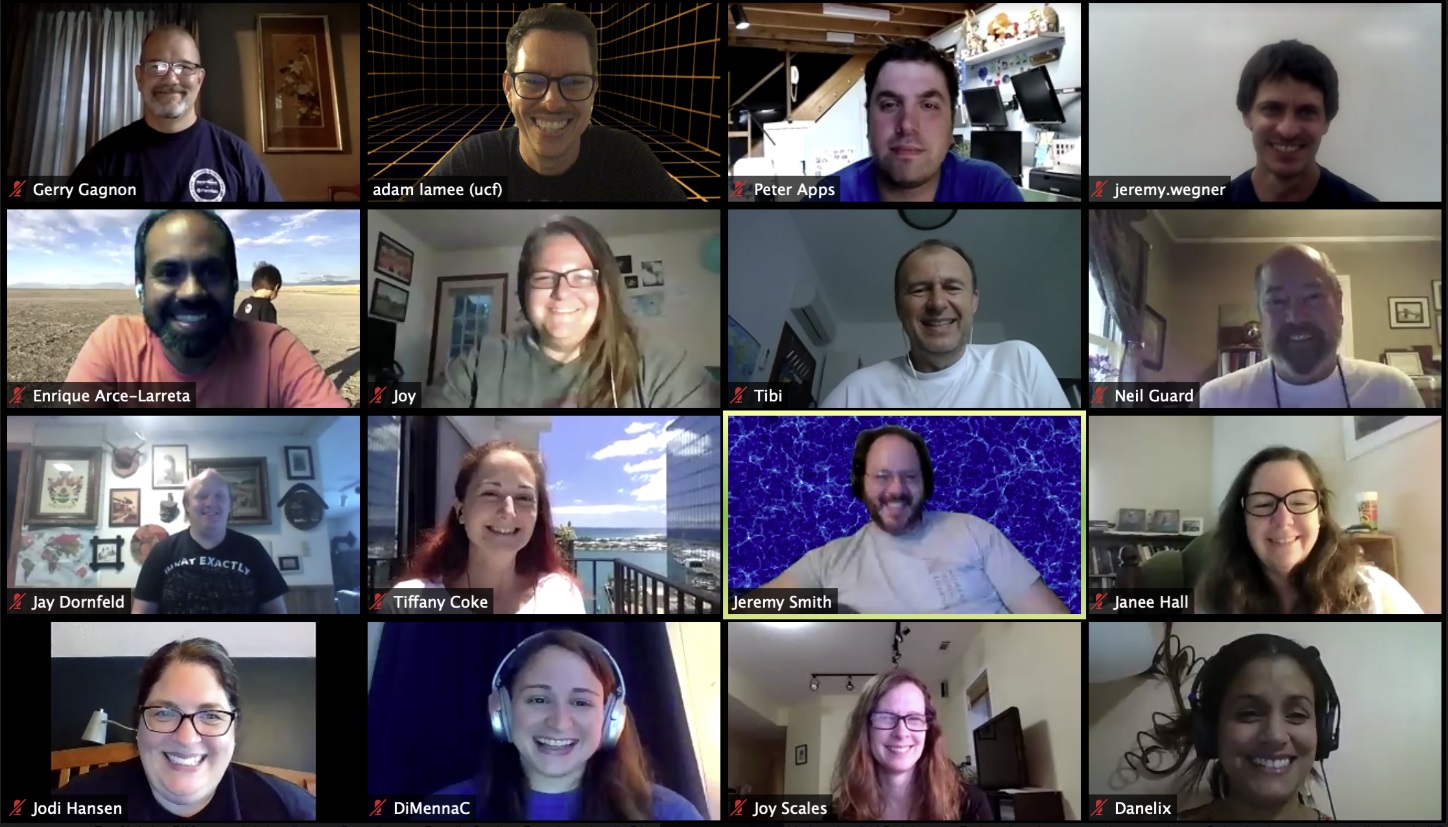Friday Flyer Super Summer Special - August 7, 2020

Spotlight on 2020 Data Camp → Virtual Camp
Twenty-four teachers participated in the first-ever Virtual Camp on coding that the Teaching and Learning fellows developed both as a response to the health concerns of an in-person workshop and to the increasing popularity and importance of coding in modern science pursuits. As with the traditional Data Camp, the workshop was divided into two phases, the “Student Hat” and the “Teacher Hat.”
During the first phase of the workshop, the participants began by getting into partner groups and executing Python code in some pre-written scaffolded Jupyter notebooks that were designed to teach specific skills and concepts that the participants would need later (for example, how to make a histogram in Python; how to import large datasets; how to utilize various libraries). Following this sequence of activities, the participants designed their own notebook to perform an analysis of large dilepton datasets from the CMS experiment; and following this analysis, they worked cooperatively to interpret their results and make conclusions in the CER framework. Finally, as the last exercise for their “student hat” phase, participants conducted an open-ended exploration of their own choosing with only the requirement that they create their own notebook using a new dataset or a deeper analysis of a dataset they had already used; again, after completing these explorations, they shared their results collaboratively and offered constructive suggestions to each other. In the second phase of the workshop, teachers developed implementation plans for their own classrooms. This began with writing a Jupyter notebook or a series of notebooks with scaffolding and differentiation appropriate to the teacher’s school and demographics followed by a brief companion document that explained how notebooks work and how these activities fit into the scope and sequence of the course and/or the educational standards set by the district or state. At the end of the workshop, participants once again shared their work with each other and offered constructive comments.
Throughout the workshop, various guest speakers visited the Zoom meetings to briefly talk about coding in the context of their profession and/or research, and answered questions from participants. The team made a greater effort to request speakers who were from underrepresented demographic groups, and this proved to be both successful and enriching.
H/T to Jeremy Smith for providing this Spotlight.


News from QuarkNet Central
Can we talk? Let's talk. A new school year is starting and, more than most years, we all have many questions. It just might help for QuarkNet teachers to get together to talk, share ideas, and talk some more. So . . . let's do that. We'll call it QuarkNet Educational Discussions (QED), and we'll Zoom in together twice per month, at least through the fall semester. Interested? Find out all about it at the new QED website. Our first get-together is next Wednesday, August 12. Show up if you can!
Don't miss your chance to compete and win in the Fermilab trivia contest on Saturday, August 15, at 1:00 PM Central Time. Register here as contestant or as audience. There will be a question for the audience too. Have fun, win prizes and learn more about Fermilab! Check out this announcement on Twitter as well!
Full support for QuarkNet cosmic ray muon detectors is available again at Fermilab. Teachers and mentors with detectors can request and get assistance for needed updates, repairs and replacements by contacting Dave Hoppert (hoppert@fnal.gov). Shipping and Receiving is operational at Fermilab, so you can send in broken components or an unused detector to the address below. Fermilab can pay for the shipping; Dave can give you the Fermilab FEDEX account number if you need it.
David Hoppert
Education Office/QuarkNet Project
Fermilab MS 226
Kirk Road and Pine Street
Batavia, IL 60510-5011 USA
Phone: +1 (630) 840-3188
Fax: +1 (630) 840-8248

Physics Experiment Roundup
Big news from the recent International Conference on High Energy Physics (ICHEP): The ATLAS and CMS experiments announced new results indicating that the Higgs boson decays into two muons. This process is thought to be very rare, with approximately one out of every 5,000 Higgs bosons decaying into these second-generation particles. Another announcement from ICHEP 2020 views the LHC in a "different light" as a high-energy photon collider. Also from CERN: The NA62 collaboration sees evidence for a very rare process that could lead to new physics beyond the Standard Model.
Over at Fermilab, a pair of construction milestones are reached: the site dedication of the Integrated Engineering Research Center and the groundbreaking for the new PIP-II cryoplant building.

Resources
It must be super-collapse Friday because we have all the black hole news you ever wanted! What do we mean? Well, how about a black hole in our solar system, as suggested in APS Physics? Or LIGO detecting gravitational waves from the collision of a massive black hole and a what is it?
And now Don Lincoln has made video episodes 15–18 of Subatomic Stories all about our dense friends hiding inside their event horizons.
We made a list:
- The truth about black holes
- Gravitational waves - ripples in spacetime
- What happens when you fall into a black hole? (Spoiler: It hurts.)
- When black holes evaporate
Staying astronomical, Fermilab has released the video Journey through the Universe based on the Sloan Digital Sky Survey.

Just for Fun
It has been quite a summer. And what better way to "celebrate" than a crossword puzzle? So here it is: the QuarkNet Summer 2020 Crossword! (Not available in stores)*
And, of course, we have xkcd and xkcd.
*Want more? Here is the extended version!
QuarkNet Staff:
Mark Adams: adams@fnal.gov
Ken Cecire: kcecire@nd.edu
Spencer Pasero: spasero@fnal.gov
Shane Wood: swood5@nd.edu
